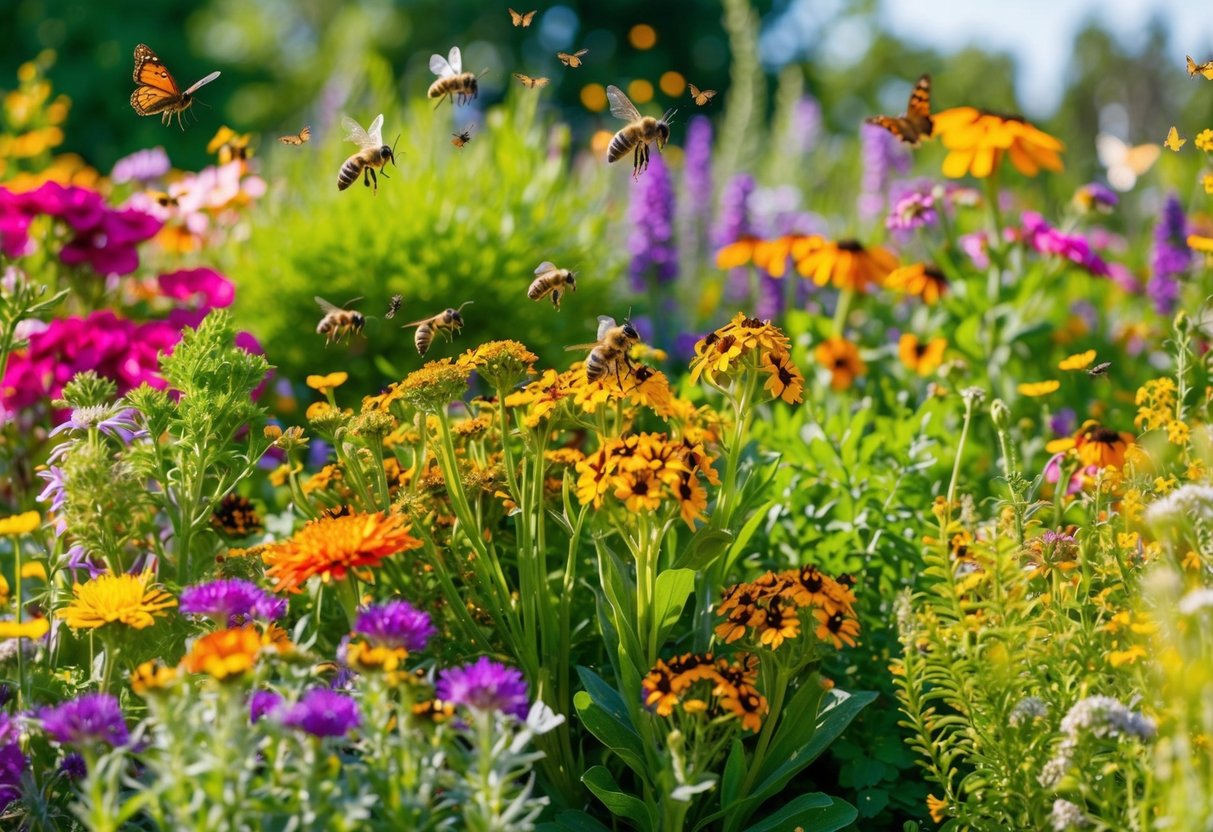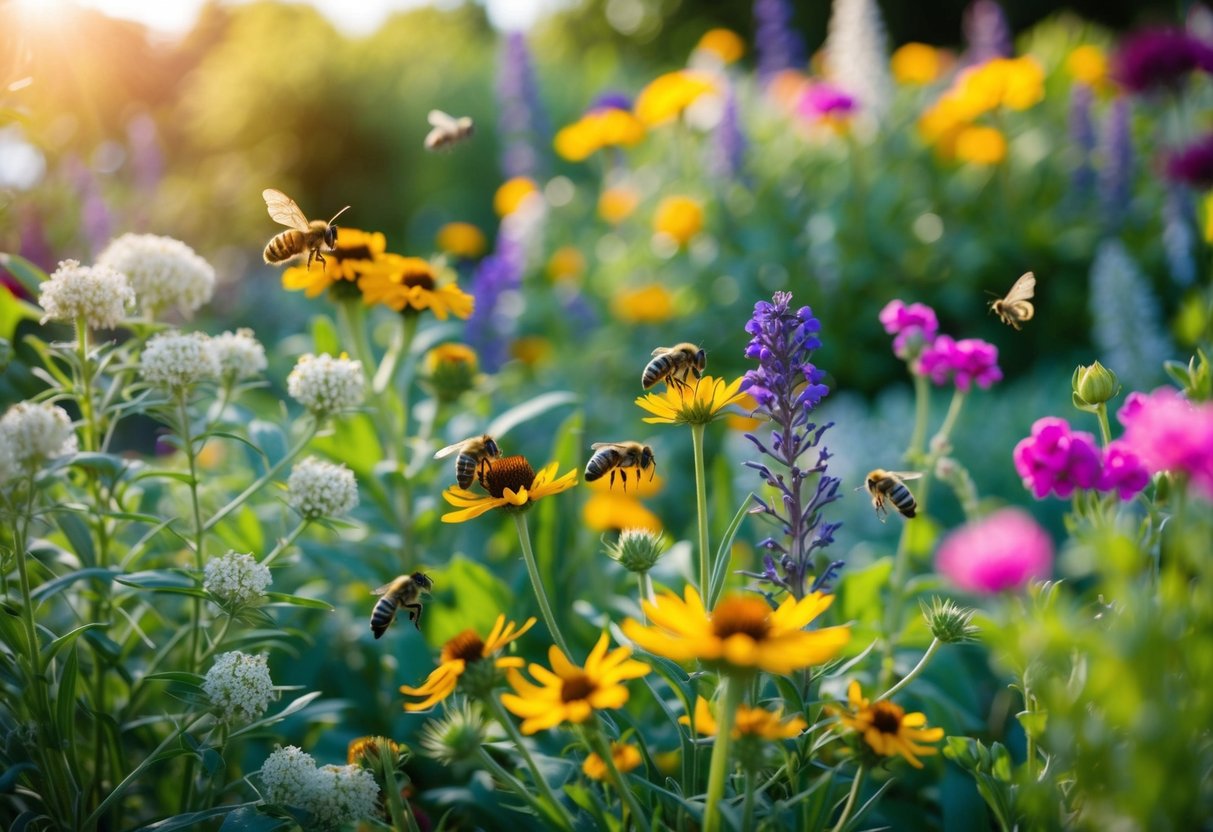
Pollen-Producing Plants
While nectar is vital, pollen provides essential proteins and lipids required by bees for their diet. To enhance a pollinator-friendly garden, incorporating pollen-producing plants like sunflowers is beneficial. Sunflowers are exceptional, offering an abundant supply of protein-rich pollen that bees actively collect. Other excellent choices include willows and poppies, which bees often seek out. These plants not only offer food but also attract a variety of pollinators that assist in plant reproduction. Providing a mix of pollen sources helps ensure that pollinators have a balanced diet. Additionally, growing plants with overlapping flowering periods ensures a continuous pollen supply over time, nurturing strong, healthy pollinator communities.
Host Plants for Caterpillar Growth
To create a thriving ecosystem for pollinators, host plants that support caterpillar development are essential. Milkweed is the primary host for monarch caterpillars, providing necessary nourishment and habitat. Choosing the right species of milkweed for the local climate will enhance the overall health of caterpillar populations. Other host plants include fennel and dill for swallowtail butterflies. These plants provide not only food but also a safe space for caterpillars to grow and metamorphose into butterflies. Integrating host plants ensures that pollinators can complete their life cycles, contributing to more resilient pollinator populations and a more balanced ecosystem within the garden setting.
Natural Pest Management Practices

Natural pest management is a vital aspect of sustainable gardening. Two effective methods include companion planting and cultivating beneficial insects.
Leveraging Companion Planting
Companion planting is a strategic approach to deter pests and enhance plant growth. Certain plants naturally repel harmful insects when grown together, reducing the necessity for chemical pesticides. For example, marigolds can protect various vegetables from nematodes, while basil can ward off flies and mosquitoes when placed near tomatoes. Additionally, planting onions or garlic alongside carrots can help repel carrot flies, ensuring a healthier harvest. These combinations allow gardeners to maintain a more balanced ecosystem, reducing the reliance on synthetic solutions.
Cultivating Beneficial Insects
Beneficial insects play a crucial role in managing pest populations naturally. Ladybugs and lacewings are known for their appetite for aphids, while parasitic wasps target caterpillars and other pests. Creating a habitat that attracts these insects involves growing diverse flowering plants that provide nectar and pollen. Plants like dill, fennel, and yarrow can help draw in these helpful insects. Providing water sources and avoiding broad-spectrum insecticides are essential steps in nurturing these natural allies. This method not only reduces the need for organic pesticides but also enhances garden biodiversity.
Cultivating Healthy Soil and Organic Matter
Creating a pollinator-friendly garden begins with cultivating healthy soil. Using compost enriches the soil with necessary nutrients and improves its structure. Composting kitchen scraps and yard waste is a sustainable method that reduces reliance on synthetic fertilizers.
Applying mulch helps retain soil moisture and prevents erosion. Mulch also suppresses weed growth, which limits the need for chemical weed killers. Wood chips, straw, or dried leaves make for effective mulch options, maintaining an organic approach.
Sustainable gardening practices include the use of organic pesticides to protect beneficial insects, like pollinators. Neem oil and insecticidal soap are examples of environmentally friendly options. These choices help maintain the ecological balance within the garden.
Another practice involves crop rotation and planting cover crops between growing seasons. Cover crops like clover or rye enrich the soil and prevent nutrient depletion. Such methods are crucial for long-term soil health and plant growth.
Incorporating native plants and flowers also fosters a thriving ecosystem. These plants often require less maintenance and adapt well to local soil and climate conditions. Native flora supports local pollinators by providing essential food and habitat.
Gardeners should regularly test soil health to adjust practices as needed. Soil testing indicates nutrient levels, pH balance, and organic matter content. Adjusting these aspects leads to a more resilient and productive garden.